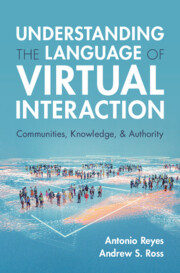Book contents
- Understanding the Language of Virtual Interaction
- Understanding the Language of Virtual Interaction
- Copyright page
- Contents
- Figures
- Tables
- 1 Introduction
- 2 Web 2, a Digital Revolution?
- 3 Digital Communication and the “Post-Truth” Era
- 4 The Formation of Virtual Communities
- 5 The Negotiation of Meaning, Knowledge, and Authority Online
- 6 (De)Legitimization of Authority in Digital Communication
- 7 Competition with Official Institutions
- 8 Politics and Participation in the Digital Public Sphere
- 9 Human Rights and Social Change in Virtual Spaces
- 10 Discourse and Identity in a Lawless Digital Universe
- 11 Conclusion
- References
- Index
7 - Competition with Official Institutions
Published online by Cambridge University Press: 05 September 2025
- Understanding the Language of Virtual Interaction
- Understanding the Language of Virtual Interaction
- Copyright page
- Contents
- Figures
- Tables
- 1 Introduction
- 2 Web 2, a Digital Revolution?
- 3 Digital Communication and the “Post-Truth” Era
- 4 The Formation of Virtual Communities
- 5 The Negotiation of Meaning, Knowledge, and Authority Online
- 6 (De)Legitimization of Authority in Digital Communication
- 7 Competition with Official Institutions
- 8 Politics and Participation in the Digital Public Sphere
- 9 Human Rights and Social Change in Virtual Spaces
- 10 Discourse and Identity in a Lawless Digital Universe
- 11 Conclusion
- References
- Index
Summary
The interactive construction of authority and expertise in online platforms around a topic (e.g., history, standard language, etc.) has challenged the way knowledge has been traditionally channeled through official institutions. The Internet has become a platform for recurrent consultation in relation to checking norms and rules or seeking advice or information through electronically mediated communication in which quasi-anonymous participants discuss, question, define, and re-construct knowledge. This chapter examines the competition between official institutions and these noninstitutional spaces for authority and legitimation in the creation of knowledge in a particular area or discipline. The chapter will explore the shift in the creation of knowledge, historically monopolized by institutional and official organizations and now facing significant challenges from online discussions. Further, it explores how institutional trust has been challenged and eroded due to the influence of digital communication and discourse. Discussions and debates such as these that have, paradoxically, fostered a more democratic exchange of information through participatory culture, are threatening the status, for instance, of democracy in countries with a long-stablished democratic tradition (US Capitol assault on January 6, 2021). This competition between official and unofficial discourses stands as a struggle for power and legitimacy in our current society.
Keywords
Information
- Type
- Chapter
- Information
- Understanding the Language of Virtual InteractionCommunities, Knowledge, and Authority, pp. 98 - 114Publisher: Cambridge University PressPrint publication year: 2025
Accessibility standard: WCAG 2.2 AAA
Why this information is here
This section outlines the accessibility features of this content - including support for screen readers, full keyboard navigation and high-contrast display options. This may not be relevant for you.Accessibility Information
Content Navigation
Allows you to navigate directly to chapters, sections, or non‐text items through a linked table of contents, reducing the need for extensive scrolling.
Provides an interactive index, letting you go straight to where a term or subject appears in the text without manual searching.
Reading Order & Textual Equivalents
You will encounter all content (including footnotes, captions, etc.) in a clear, sequential flow, making it easier to follow with assistive tools like screen readers.
You get concise descriptions (for images, charts, or media clips), ensuring you do not miss crucial information when visual or audio elements are not accessible.
You get more than just short alt text: you have comprehensive text equivalents, transcripts, captions, or audio descriptions for substantial non‐text content, which is especially helpful for complex visuals or multimedia.
Visual Accessibility
You will still understand key ideas or prompts without relying solely on colour, which is especially helpful if you have colour vision deficiencies.
You benefit from high‐contrast text, which improves legibility if you have low vision or if you are reading in less‐than‐ideal lighting conditions.
